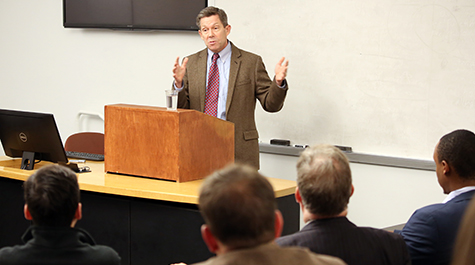Judge Jeffrey Sutton Emphasizes the Importance of State Constitutions
Judge Jeffrey Sutton of the United States Court of Appeals for the Sixth Circuit spoke at William & Mary Law School on Oct. 29 about his new book and the importance of state constitutions. Hosted by the Institute of Bill of Rights Law, his talk was part of the Dunn Lecture Series.
Sutton has sat on the Sixth Circuit since 2003 after being nominated by President George W. Bush. His book, 51 Imperfect Solutions: States and the Making of American Constitutional Law (Oxford University Press), was published in June of this year.
During his talk, Sutton emphasized his concern about the power of the United States Supreme Court. He stated that state courts should take their responsibilities to interpret their constitutions more seriously, as the Founding Fathers originally intended.
“All of the rights that we pride so much didn’t originate in the Bill of Rights or the 14th Amendment; they originated in the state constitutions,” Sutton said. “We started by thinking state courts would be the first responders when it came to rights disputes. Fast forward to 2018—all of our legal culture is about the US Supreme Court [and] the US Constitution.”
Sutton suggested that state courts serve as “constitutional labs of interpretation” to experiment with different ways of interpreting the US Constitution and their own state constitutions before a generalized national judgment from the US Supreme Court. He said that this would allow states to customize judgments to their own state history.
“In a world where we have highly generalized guarantees, often leading to indeterminate legal questions, why would we simultaneously have a world where state court judges are lock-stepping their interpretations and lashing themselves to US Supreme Court interpretations of very generalized actions?” he asked.
Sutton received his B.A. from Williams College in Massachusetts in 1983 and his J.D. from The Ohio State University in 1990. He was a law clerk for Justice Lewis Powell and Justice Antonin Scalia, both on the US Supreme Court, in 1991 and 1992. Before being nominated for the Sixth Circuit, he was a partner at Jones Day Reavis & Pogue in Columbus, Ohio, and held the position of State Solicitor of Ohio.
About William & Mary Law School
Thomas Jefferson founded William & Mary Law School in 1779 to train leaders for the new nation. Now in its third century, America's oldest law school continues its historic mission of educating citizen lawyers who are prepared both to lead and to serve.
